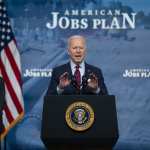President Joe Biden created the White House Gender Policy Council — the first free-standing council focused on gender equity and equality specifically within the executive office — as one of his first moves in office. The council would focus on “uplifting the rights of girls and women.”
Jennifer Klein, the former chief strategy and policy officer at TIME’S UP, a movement against sexual harassment founded in 2018, is a co-chair of the council along with Julissa Reynoso, Dr. Jill Biden’s chief of staff. For more than 25 years, Klein has worked on gender equality, serving as the co-chair of the Women and Families Policy Committee during the Biden-Harris campaign, senior adviser on women’s issues during Hillary Clinton’s presidential campaign and former deputy and senior adviser in the State Department’s Office of Global Women’s Issues.
The Biden administration continues to negotiate the passage of a $2 trillion federal jobs and infrastructure package and a $1.8 trillion American Families Plan. If passed, the former would invest billions of dollars in the nation’s home care system and the latter would use billions to reinvigorate the child care industry and create the country’s first universal paid family and medical leave policy.
In an exclusive interview, Klein spoke to The 19th about the Gender Policy Council’s role in dismantling economic and health barriers faced by women and girls as the country recovers from COVID-19 and the women’s recession it caused.
This interview has been edited for length and clarity.
Mariel Padilla: It’s been about three months since the president signed the executive order establishing the Gender Policy Council. How has it been going?
Jennifer Klein: The president really showed what a priority work on gender is to his administration, including the intersections between race, gender and other issues of equity. The existence of this council is just one piece of proof.
Our priorities so far fall in three different buckets, all of which contain issues that concern women and girls. The first is economic security. Issues of caregiving are enmeshed with that, as we’ve seen over the course of the last year. The second is gender-based violence. We saw during the pandemic that gender-based violence was almost a shadow epidemic, another public health crisis as people were literally forced to stay home with their abusers, in some cases. The third bucket is women’s health. Even before the pandemic, there were long-standing issues with reproductive health and rights. For example, Black maternal mortality rates have been disproportionately high, so we’ve been focused on how to address that.
How do you see the Gender Policy Council’s role in the country’s pandemic recovery efforts?
One of the things we’ve seen in this pandemic and the recovery is that women really are our core. They are essential workers because they bear a lot of caregiving responsibility at home. So I think the existence of this council is really important. These issues cross borders and they also cross policy councils. My job is to ensure that I’m working hand in hand with the National Economic Council, the Domestic Policy Council and the National Security Council — which is exactly what we do every day to make sure not only that we’re focused on gender issues and gender equity, but also on how these issues are embedded in all of the country’s policies.
We wake up every day thinking about these intersections, particularly between race and gender.
How does the council plan on beefing up the child care and home care industries, especially given the pandemic stimulus packages will run out in a few years?
All of the pieces of the proposed American Jobs Plan and the American Families Plan relate to caregiving. There’s currently $400 billion allocated for home and community-based care, and there are two reasons to make that level of investment. The first is the workers themselves, who have historically lacked dignity and lacked adequate pay and benefits. The second is that the people who need care need to be able to access it in their homes rather than in institutions. The caregiving field is predominantly female, and women generally try to balance the responsibilities that they have at work and home. When child care centers and schools began closing, as elderly family members needed extra care, the need for investment in caregiving became more critical.
In addition to home and community-based care, which is vital, Biden’s proposed plans address the serious investment needed in child care, early education and paid family and medical leave for the U.S. labor force. One of the essential ways to increase labor force participation, particularly for women, is to provide caregiving support.
As Biden continues to negotiate his infrastructure and families plans to attain bipartisan support, is there any concern that the funding for home care and child care won’t be included in the final plans? Is there a contingency plan?
I’m not willing to entertain the contingency plan yet. I sort of keep echoing the president, who keeps saying and meaning that the only thing that is not acceptable is inaction. I really mean this. I don’t just say this. Partly because of the pandemic, it has become obvious how important these issues of care are for the first time in the last several decades.
I think we’ve made significant strides, both as a substantive matter and as a political matter. There are people who didn’t historically see these issues as core to our economy. You can’t really look away at this point.
From your vantage point as the head of this council, are you getting a sense that the push for caregiving infrastructure is a bipartisan effort?
I think it’s a more bipartisan effort than it has been historically. I mean, nothing about this pandemic is an opportunity, but it has made the case entirely obvious that we have a crisis in this country — a crisis of caregiving. And we need to address that crisis. And I think the second thing that it has done is made it really clear that this can’t just remain a private responsibility, which is one of the things that differentiates the U.S. from many other countries. We’re literally one of a few countries that have no paid family or medical leave at all. Part of the reason for that has been this historic American notion that you have to figure this out on your own, that it’s a purely personal responsibility. And I think what we’ve learned over the course of the last year and a half is that there is a public responsibility, and we will be held accountable. We will face the consequences if people don’t have the family support they need.
So I think it’s become a much more bipartisan issue because it’s just become more obvious. I certainly don’t think we’re there yet, and we are certainly living through an incredibly partisan time, but we’re seeing that the president is working really hard to get bipartisan support. And leaving aside the partisanship in Congress, I think you definitely see that these issues of care and jobs that we ask our essential workers to do are bipartisan. There’s all sorts of polling that shows overwhelming bipartisan support for these issues among the American people.
Outside of Biden’s proposed American Jobs Plan and American Families Plan, is the Gender Policy Council working on any other policies related to caregiving?
We’re always working on using the bully pulpit and hosting events to raise issues that businesses are living through, including how to ensure workers can get child care so their workers get back to work. They’re literally experiencing labor shortages because of inadequate child care, so we’re trying to do all of these things to raise attention and awareness.
We’re also always working on whatever we can do by executive action to help women attain economic security over their lifetimes and careers. We think a lot about pay equity and what we can do there. But I would say that the big focus of the summer will be trying to get these plans to the finish line.






